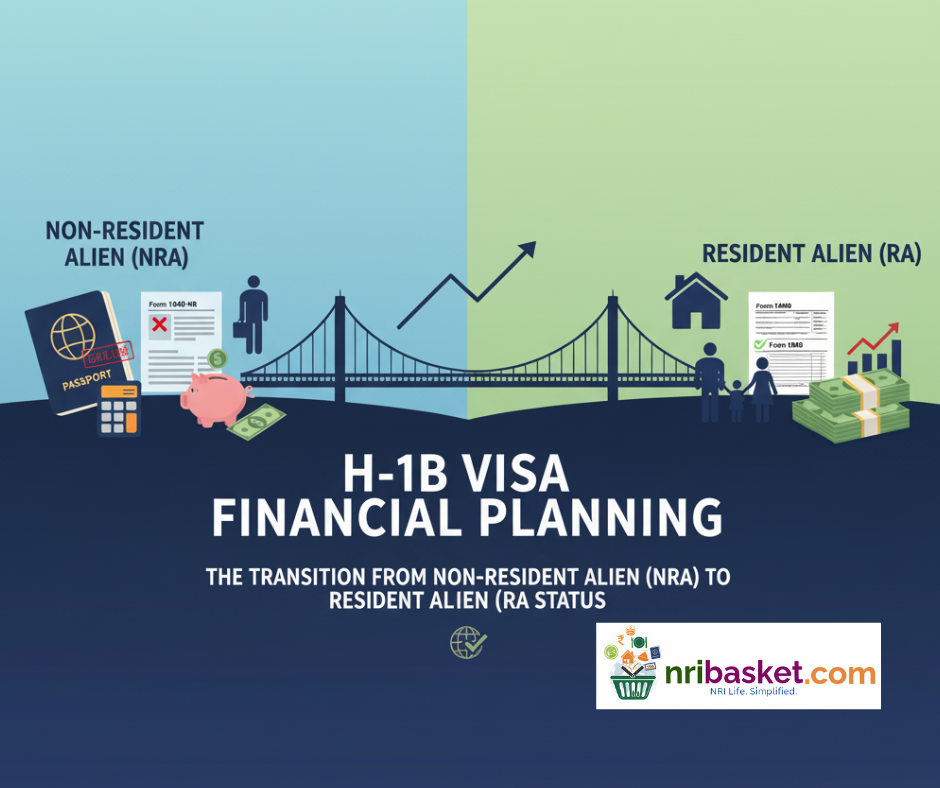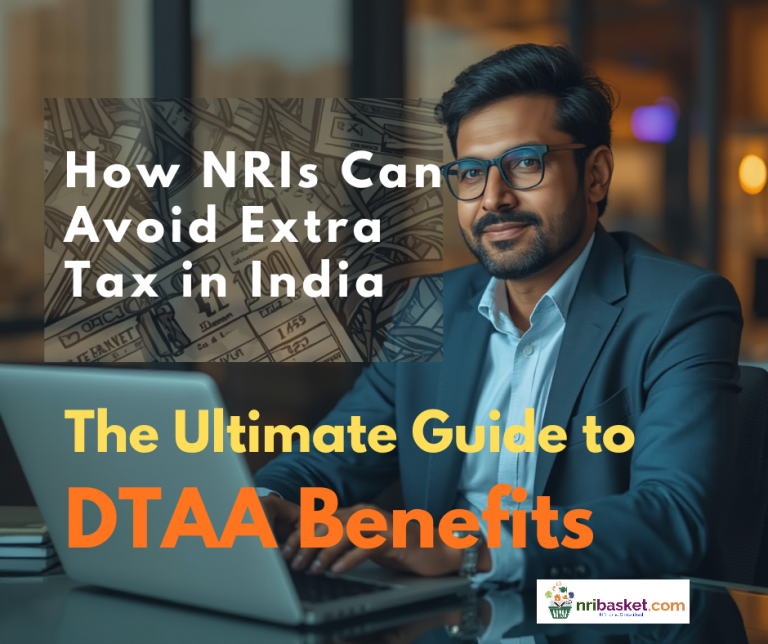
H-1B Visa Financial Planning
When you move to the United States on an H-1B visa, your financial and tax responsibilities can feel complex—especially as you shift from being a Non-Resident Alien (NRA) to a Resident Alien (RA). This change affects how your income is taxed, what deductions you can claim, and even how you invest or save for the future.
In your first year, you may qualify as a dual-status taxpayer, meaning part of your income is taxed under different rules. Understanding these differences early helps you plan your finances efficiently, avoid penalties, and take advantage of US tax benefits.
In this guide, we’ll explain how to handle tax returns for your first H-1B year, when your status changes from NRA to RA, and how smart financial planning for H-1B visa holders can set the foundation for long-term financial stability in the US.
Long Answer: An NRA is someone who doesn’t meet the US tax residency tests, while an RA is treated like a US citizen for tax purposes. Once you pass the substantial presence test (usually after living in the US for 183 days in a year), you become a Resident Alien and must report worldwide income.
Long Answer: The IRS uses the Substantial Presence Test to determine residency. If you’re on an H-1B visa and spend at least 183 days in the US in the current year (or meet the weighted formula over three years), you’re considered a Resident Alien for tax purposes.
Long Answer: You must be physically present in the US for 183 days during the current year, or meet a 3-year weighted total: all days this year + 1/3 of last year’s days + 1/6 of the year before that. Meeting this test makes you a Resident Alien.
Long Answer: As an NRA, you’re taxed only on US income. Once you become an RA, you must report and pay taxes on your global income. This includes salary, bank interest, rental income, and investments earned inside and outside the US.
Long Answer: If you don’t meet the Substantial Presence Test in your first year but do in the next, you can elect to be treated as a Resident Alien for part of the year. This helps simplify tax filing and may reduce overall tax liability.
Long Answer: The First-Year Choice lets H-1B visa holders who become residents later in the year file as part-year residents. You’ll be an NRA for the first part of the year and an RA for the rest, reporting worldwide income only for the RA portion.
Long Answer: Non-Resident Aliens must file IRS Form 1040-NR to report only US income. Once you become a Resident Alien, you file Form 1040 like a US citizen and report worldwide income, claiming credits and deductions available to residents.
Long Answer: If you meet the Substantial Presence Test, you file Form 1040. If not, file Form 1040-NR as an NRA. In transition years, you may qualify for dual-status filing, where you use both forms to reflect part-year residency.
Long Answer: Dual-status taxpayers are NRAs for part of the year and RAs for the rest. You’ll file Form 1040 for your resident period and attach Form 1040-NR for your non-resident period. It’s common in your first or last year in the US.
Long Answer: Certain countries have tax treaties with the US that reduce or exempt income tax for NRAs. Once you become a Resident Alien, most treaty benefits no longer apply. Always review your country’s treaty with the US before filing.
Long Answer: H-1B holders classified as Resident Aliens are subject to Social Security and Medicare taxes like US citizens. NRAs on certain visas (like F-1 or J-1) may be exempt, but H-1B holders are generally required to pay these taxes.
Long Answer: Once you become a US tax resident, you must disclose foreign bank accounts if the total balance exceeds $10,000 using FBAR (FinCEN Form 114) and may also need to file Form 8938 (FATCA) for higher balances.
Long Answer: H-1B employees can participate in employer-sponsored retirement plans such as 401(k)s. Contributions lower your taxable income, and employers may offer matching benefits, which is great for long-term financial planning.
Long Answer: You can open a Traditional or Roth IRA once you have valid Social Security and earned income in the US. IRAs help build long-term savings and offer tax benefits depending on the type of account you choose.
Long Answer: Many H-1B holders keep accounts in both countries to handle expenses, transfers, and investments. Just remember to report any foreign accounts once you become a Resident Alien to stay compliant with US tax laws.
Long Answer: As an NRA, you pay a flat 30% on certain US-source income. After becoming an RA, you’re taxed on worldwide income using the standard US progressive tax brackets, with access to deductions and credits that reduce liability.
Long Answer: In your first year, open a US bank account, get a Social Security Number, track your US stay days for tax status, and decide whether to use the First-Year Choice election. Start contributing to retirement and build emergency savings.
Long Answer: Resident Aliens can claim eligible dependents under US tax law. If you’re still an NRA, you generally cannot. You must provide valid SSNs or ITINs for dependents to claim exemptions or child tax credits.
Long Answer: As a Resident Alien, you must declare dividends, interest, and capital gains from foreign investments. The US taxes worldwide income, so keeping proper records and understanding double taxation treaties is essential.
Long Answer: H-1B holders follow the same tax calendar as US citizens. The standard deadline is April 15 (or the next business day), with an option to file an extension using Form 4868 to get more time until October 15.
Long Answer: Non-Resident Aliens cannot claim the standard deduction, except for residents of certain countries under treaty benefits. Once you become a Resident Alien, you can take the standard deduction like a US citizen.
Long Answer: H-1B first-year taxes can be complex due to dual-status rules and treaty eligibility. A CPA familiar with expat and H-1B taxation can ensure you file correctly, avoid double taxation, and maximize deductions.
Long Answer: Sending money from the US to your home country is not taxable. However, income earned abroad must still be reported if you are a Resident Alien. Transfers themselves are not taxable events.
Long Answer: If you pay taxes in both the US and your home country, claim a credit for foreign taxes paid using Form 1116. Review your country’s tax treaty with the US to avoid being taxed twice on the same income.
Long Answer: If your employer withheld more than your actual tax liability, you can get a refund when you file your return. This is common in your first H-1B year as your income period may be shorter than a full year.
Long Answer: In addition to federal taxes, many states require income tax. Your state residency is usually based on where you live and work, not visa status. File both federal and state returns if required.
Long Answer: If you leave before meeting the Substantial Presence Test, you’ll likely remain an NRA for that year. If you met it before departure, you’ll file as an RA or dual-status taxpayer depending on the dates.
Long Answer: Small personal gifts to family are not taxable. However, if gifts exceed $100,000 to foreign individuals, you must report them using Form 3520. Tax applies only to donors on large lifetime gifts over the federal limit.
Long Answer: Focus on building credit, contributing to retirement plans, maintaining emergency funds, and filing accurate taxes each year. Understand how your tax status and long-term immigration goals affect financial decisions.
Long Answer: Track your visa start date, understand tax residency rules, save at least 3–6 months of expenses, invest through 401(k) or IRA, and get professional help for tax filing. Good financial planning helps you stay compliant and secure your future in the US.
Above Faq list explaine following topics Financial planning for H1B visa holders, H1B visa tax guide, tax return for H1B first year, non-resident to resident alien tax status, H1B investment planning, H1B visa savings and taxes, H1B resident alien rules, first year H1B tax filing, H1B visa 401k eligibility, H1B income tax tips, H1B foreign income reporting, H1B tax return filing USA, resident alien tax benefits.





